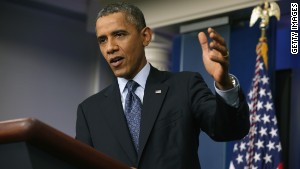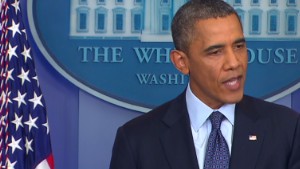Editor's note: Eric Liu is the founder of Citizen University and author of several books, including "The Gardens of Democracy" and "The Accidental Asian." He served as a White House speechwriter and policy adviser for President Clinton. Follow him on Twitter @ericpliu
(CNN) -- Last week, as the government shutdown began, I found myself irritated by establishment conservative commentators like Peggy Noonan, who said President Obama needed to lead and resolve the crisis -- as if the hostage-takers in the House had nothing to do with the matter.
But lately, I've realized that those commentators were right. The pro-shutdown radicals have no interest in resolution. Moderate Republicans are too timid and too few. And it's too easy for angry Democrats to point out, as was my own first reflex, that they didn't create this mess.
So it does fall to Obama to lead us out of the dysfunction. Thus far, he's focused more on a Beltway audience. In a news conference on Tuesday, Obama explained lucidly that the economy shouldn't be treated as ransom. But few Americans were watching. And for the most part, he has used his aides or private phone calls to reiterate his position that no substantive negotiations can begin until the tea party caucus releases the government.
 Eric Liu
Eric Liu This is not wrong. It's just an inside game. What the president needs to do now is play the outside game robustly.
Now, again, let's be very clear: This shutdown is the making of a reckless fringe of the Republican Party and a House speaker too weak to control it. There should be no false equivalency in any honest reading of the origins of the crisis. But in the end, pointing out this asymmetry of blame is not the same as leading. Leaders solve problems. They lead.
Although the president didn't make this crisis, he needs to fix it. To do that, he should start using his office far more assertively, to shift the terms of the debate so that he is understood in popular opinion not as one of two equal antagonists but as the sole representative of sane, grown-up, responsible leadership.
Obama has a national megaphone that no one -- not even a senator staging a fake filibuster -- can match. He is more trusted (or at least less mistrusted than Congress) to tell it straight.
 Obama: Boehner should not delay vote
Obama: Boehner should not delay vote  Obama: America's good name is at stake
Obama: America's good name is at stake Here are a few ways for him to take the initiative.
1. Speak directly to Americans.
First, the president should speak more directly and more often to the American people. He could do a series of "fireside chats" every night for a week, describing how we got here, explaining why giving in to tea party blackmail would be wrong and generating popular pressure on Speaker John Boehner to end the shutdown.
His team could put the chats on social media and let them spread or even buy a block of ad time during Sunday's football games to air the whole series.
If the crisis drags on and the date of default approaches, he should do a prime-time address from the Oval Office befitting the level of crisis. Stagecraft matters. A news conference like the one he held on Tuesday is better than nothing, but it is still playing to the Washington media and is inherently reactive.
2. Build a "coalition of the responsible."
The president should invite every non-radical Republican he can find -- not just current Washington players but also recent candidates like Tim Pawlenty and elders like President George H.W. Bush and Colin Powell, as well as business leaders from across the country -- for a national unity session that claims the center and isolates the fringe.
The message of the session, voiced not by him but by these Republicans, should be that while the parties can disagree vehemently on taxes and spending and health care, using as leverage the financing of government itself is radical and dangerous. The president should emphasize that his quarrel is not with Republican voters or their party but with a band of radicals.
3. Meet the people, especially those who hate you.
The president should schedule town meetings in the districts of the most radical Republicans, offering to meet with the citizens there to listen and to make his case. He will certainly face vitriol. But that's the point: He will face it. He will be there meeting people with respect and even empathy. He will show that he doesn't write off any American, even those who demonize him. This will be far more powerful than going to friendly audiences for staged events -- and it will make clear to independents that he can break out of the usual partisan script.
4. Get concrete about good faith.
Fourth, he could go beyond his generic willingness to discuss long-term tax and entitlement issues and commit specifically to a negotiation that begins the day after the government reopens and the debt ceiling is satisfactorily raised. Here, too, he can claim the mantle of good faith and reasonableness.
Of course, he could also do all of the above, with campaign-style optimism and an openness of mind and heart that will contrast sharply with the fanaticism of the pro-shutdown caucus.
This prefabricated crisis may end suddenly, or it may linger and bring us to the very edge of a disastrous default. Either way, it behooves the president now to lead in more visible, more symbolic, more populist ways -- not only to prevail on this fight but to restore a politics in which not every fight has to be a fight to the death. Congress has never made it clearer why we need a strong president.
Follow @CNNOpinion on Twitter.
Join us at Facebook/CNNOpinion.
{ 0 comments... read them below or add one }
Post a Comment